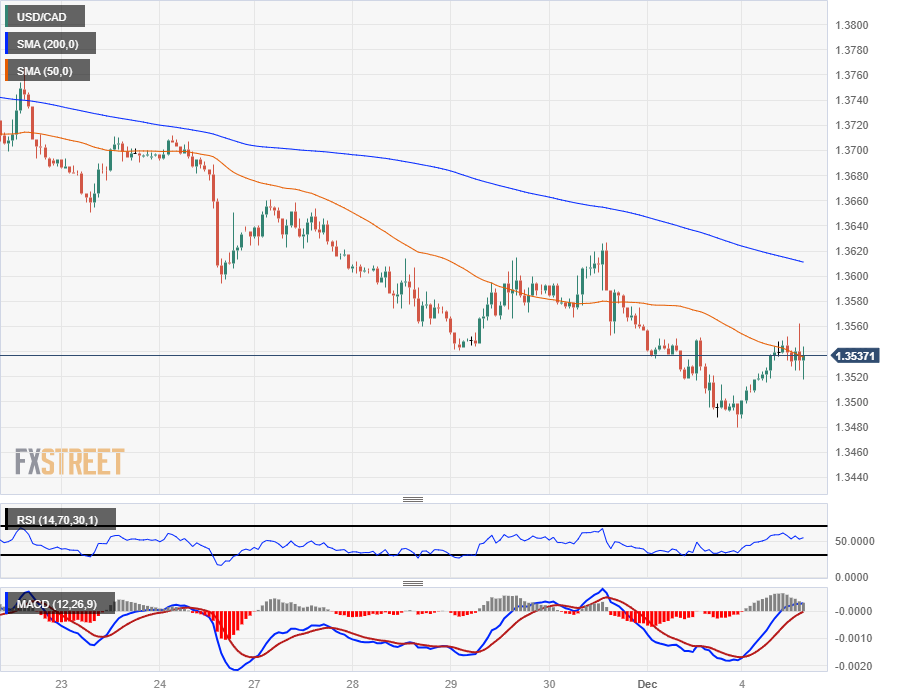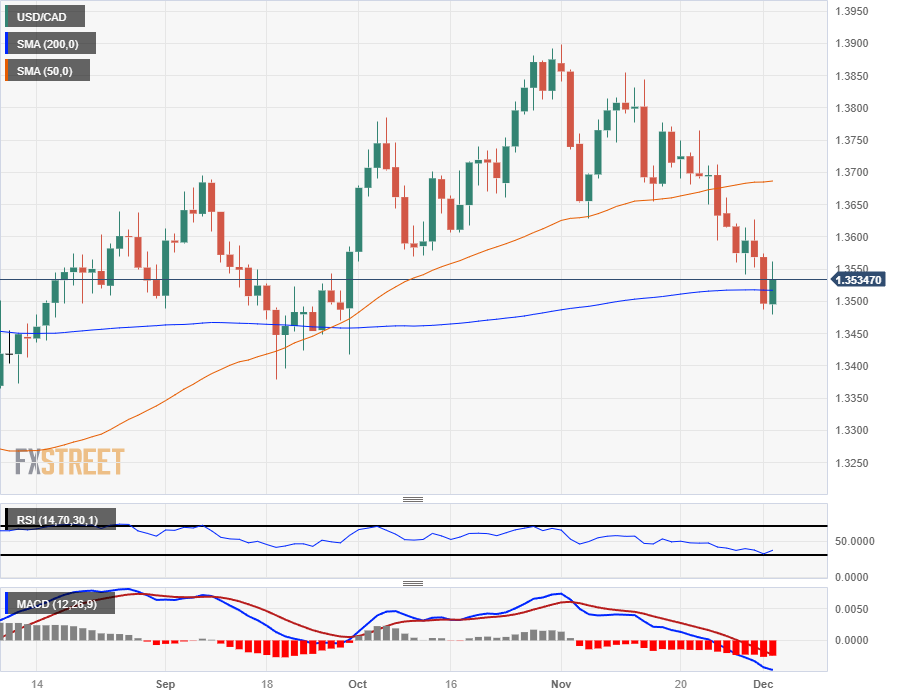- Phân tích
- Tin tức và các công cụ
- Tin tức thị trường
- Canadian Dollar struggles to hold onto recent gains as US Dollar rebounds
Canadian Dollar struggles to hold onto recent gains as US Dollar rebounds
Most recent article: Canadian Dollar stretches higher against the US Dollar on Friday after Canadian jobs beat
- The Canadian Dollar sees downside pressure on Monday.
- Canadian economic calendar data is limited in the early week, USD flows to dominate.
- The next BoC rate call is coming up on Wednesday.
The Canadian Dollar (CAD) pared back some of last week’s gains as the US Dollar (USD) sees a broad-market recovery on the back of renewed risk aversion. The Canadian Dollar is down roughly a third of a percent against the Greenback on Monday.
Canada is absent from the economic calendar for the early half of the week, with the latest rate call from the Bank of Canada (BoC) due on Wednesday. The BoC is expected to hold rates steady at 5% for the fourth meeting in a row.
Daily Digest Market Movers: Risk aversion is back on the menu as investor appetite sours, Canadian Dollar softens as US Dollar recovers
- The Canadian Dollar has given back four-tenths of a percent against the US Dollar in Monday trading.
- The CAD has performed strongest against the Antipodeans to kick off the trading week, up nearly six-tenths of a percent and a third of a percent against the Aussie (AUD) and the Kiwi (NZD), respectively.
- The BoC’s upcoming rate call should represent an entire quarter of no rate hikes, as long as policymakers meet markets in the middle.
- The BoC raised eyebrows when they gave interest rates an additional 25-basis-point bump back in July.
- Monday’s markets are chewing on a miss in US Factory Orders, which also saw a downside revision to previous figures.
- US Factory Orders declined 3.6% in October, falling even further below the median market forecast of a 2.6% contraction.
- September’s US Factory Orders were revised from 2.6% to 2.3%.
- Tuesday will bring more of the same CAD-light data docket, with the US ISM Services Purchasing Managers Index (PMI) being the key data focus.
Canadian Dollar price today
The table below shows the percentage change of Canadian Dollar (CAD) against listed major currencies today. Canadian Dollar was the weakest against the US Dollar.
| USD | EUR | GBP | CAD | AUD | JPY | NZD | CHF | |
| USD | 0.63% | 0.76% | 0.38% | 0.95% | 0.42% | 0.76% | 0.64% | |
| EUR | -0.65% | 0.14% | -0.20% | 0.33% | -0.22% | 0.15% | 0.00% | |
| GBP | -0.79% | -0.13% | -0.38% | 0.19% | -0.33% | 0.00% | -0.13% | |
| CAD | -0.41% | 0.22% | 0.36% | 0.58% | -0.01% | 0.36% | 0.23% | |
| AUD | -0.96% | -0.33% | -0.19% | -0.58% | -0.55% | -0.18% | -0.33% | |
| JPY | -0.48% | 0.21% | 0.49% | -0.04% | 0.54% | 0.34% | 0.20% | |
| NZD | -0.76% | -0.13% | 0.00% | -0.38% | 0.19% | -0.34% | -0.14% | |
| CHF | -0.66% | -0.01% | 0.12% | -0.26% | 0.31% | -0.22% | 0.12% |
The heat map shows percentage changes of major currencies against each other. The base currency is picked from the left column, while the quote currency is picked from the top row. For example, if you pick the Euro from the left column and move along the horizontal line to the Japanese Yen, the percentage change displayed in the box will represent EUR (base)/JPY (quote).
Technical Analysis: Canadian Dollar attempts to arrest further declines after Greenback bidders draw a line in the USD/CAD at 1.3500
The Canadian Dollar (CAD) fell back against the US Dollar (USD) in a broad-market risk rebound that sent the USD/CAD higher after rebounding from the 1.3500 handle.
Near-term bullish momentum remains limited with the USD/CAD getting snagged on the 50-hour Simple Moving Average (SMA), and Monday’s current high bid sits at 1.3560.
Intraday action sees a technical ceiling at the 200-hour SMA near 1.3610, and the figure for Canadian Dollar bidders to beat will be Monday’s bottom bids at 1.3480.
Monday’s pullback brings omens of US Dollar (USD) strength on the daily candlesticks, with the 200-day SMA acting as technical support just above the 1.3500 handle.
Adding to the US Dollar rebound picture, technical indicators are leaning firmly into exhaustion territory, with the 14-day Relative Strength Index (RSI) tapping the lower bound, indicating oversold conditions.
On the other hand, a bullish continuation of the Canadian Dollar’s recent strength will see a fresh run at September’s low bids near 1.3380.
USD/CAD Hourly Chart

USD/CAD Daily Chart

Canadian Dollar FAQs
What key factors drive the Canadian Dollar?
The key factors driving the Canadian Dollar (CAD) are the level of interest rates set by the Bank of Canada (BoC), the price of Oil, Canada’s largest export, the health of its economy, inflation and the Trade Balance, which is the difference between the value of Canada’s exports versus its imports. Other factors include market sentiment – whether investors are taking on more risky assets (risk-on) or seeking safe-havens (risk-off) – with risk-on being CAD-positive. As its largest trading partner, the health of the US economy is also a key factor influencing the Canadian Dollar.
How do the decisions of the Bank of Canada impact the Canadian Dollar?
The Bank of Canada (BoC) has a significant influence on the Canadian Dollar by setting the level of interest rates that banks can lend to one another. This influences the level of interest rates for everyone. The main goal of the BoC is to maintain inflation at 1-3% by adjusting interest rates up or down. Relatively higher interest rates tend to be positive for the CAD. The Bank of Canada can also use quantitative easing and tightening to influence credit conditions, with the former CAD-negative and the latter CAD-positive.
How does the price of Oil impact the Canadian Dollar?
The price of Oil is a key factor impacting the value of the Canadian Dollar. Petroleum is Canada’s biggest export, so Oil price tends to have an immediate impact on the CAD value. Generally, if Oil price rises CAD also goes up, as aggregate demand for the currency increases. The opposite is the case if the price of Oil falls. Higher Oil prices also tend to result in a greater likelihood of a positive Trade Balance, which is also supportive of the CAD.
How does inflation data impact the value of the Canadian Dollar?
While inflation had always traditionally been thought of as a negative factor for a currency since it lowers the value of money, the opposite has actually been the case in modern times with the relaxation of cross-border capital controls. Higher inflation tends to lead central banks to put up interest rates which attracts more capital inflows from global investors seeking a lucrative place to keep their money. This increases demand for the local currency, which in Canada’s case is the Canadian Dollar.
How does economic data influence the value of the Canadian Dollar?
Macroeconomic data releases gauge the health of the economy and can have an impact on the Canadian Dollar. Indicators such as GDP, Manufacturing and Services PMIs, employment, and consumer sentiment surveys can all influence the direction of the CAD. A strong economy is good for the Canadian Dollar. Not only does it attract more foreign investment but it may encourage the Bank of Canada to put up interest rates, leading to a stronger currency. If economic data is weak, however, the CAD is likely to fall.
© 2000-2026. Bản quyền Teletrade.
Trang web này được quản lý bởi Teletrade D.J. LLC 2351 LLC 2022 (Euro House, Richmond Hill Road, Kingstown, VC0100, St. Vincent and the Grenadines).
Thông tin trên trang web không phải là cơ sở để đưa ra quyết định đầu tư và chỉ được cung cấp cho mục đích làm quen.
Giao dịch trên thị trường tài chính (đặc biệt là giao dịch sử dụng các công cụ biên) mở ra những cơ hội lớn và tạo điều kiện cho các nhà đầu tư sẵn sàng mạo hiểm để thu lợi nhuận, tuy nhiên nó mang trong mình nguy cơ rủi ro khá cao. Chính vì vậy trước khi tiến hành giao dịch cần phải xem xét mọi mặt vấn đề chấp nhận tiến hành giao dịch cụ thể xét theo quan điểm của nguồn lực tài chính sẵn có và mức độ am hiểu thị trường tài chính.
Sử dụng thông tin: sử dụng toàn bộ hay riêng biệt các dữ liệu trên trang web của công ty TeleTrade như một nguồn cung cấp thông tin nhất định. Việc sử dụng tư liệu từ trang web cần kèm theo liên kết đến trang teletrade.vn. Việc tự động thu thập số liệu cũng như thông tin từ trang web TeleTrade đều không được phép.
Xin vui lòng liên hệ với pr@teletrade.global nếu có câu hỏi.















